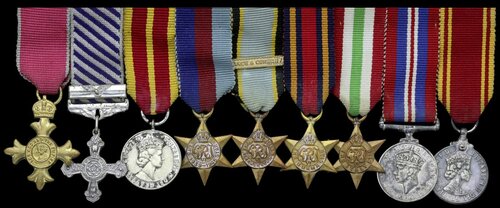
Auction: 20003 - Orders, Decorations and Medals
Lot: 515
The mounted group of nine miniature dress medals attributed to Squadron Leader J. C. Maxwell, Royal Air Force Volunteer Reserve, later Chief Fire Officer, Cambridgeshire Fire and Rescue Service, and Deputy Commandant, Fire Service Staff College
The Most Excellent Order of the British Empire, O.B.E. (Civil) Officer’s 2nd type badge, silver-gilt; Distinguished Flying Cross, G.VI.R., with Second Award Bar; Queen’s Fire Service Medal, for Distinguished Service; 1939-45 Star; Air Crew Europe Star, 1 clasp, France and Germany; Burma Star; Italy Star; War Medal 1939-45; Fire Brigade Long Service Medal, E.II.R., mounted as worn, very fine (9)
O.B.E. London Gazette 1 January 1975:
John Campbell Maxwell, D.F.C., Chief Fire Officer, Cambridgeshire Fire and Rescue Service.
D.F.C. London Gazette 18 January 1944. The Recommendation states:
‘Flying Officer Maxwell is now filling the post of Squadron Bombing Leader. His operational record and fine offensive spirit in the air is only equalled by his skill and leadership on the ground.
Immediately prior to taking up his present post, this officer completed a short intensive tour of operations, taking part in attacks on Hamburg, Milan, Cologne, Essen, Mannheim, and many other heavily defended targets. His courage and determination in his aircrew capacity reflect most highly upon him. At short notice, this officer was posted to his present unit as Squadron Bombing Leader. His increased responsibilities on the ground have in no way impaired his desire to fly on operations and he performs his present duties with two main objects in view - the delivery of more bombs by all crews on to the target and his own participation in the transaction.
He has consistently shown a great devotion to duty and fully merits the award of the Distinguished Flying Cross.’
D.F.C. Second Award Bar London Gazette 14 November 1944. The Recommendation states:
‘This officer has now completed his first tour of operations consisting of 30 sorties and comprising 178 hours operational flying, the latter part of which has been carried out as Squadron Bombing Leader. He has participated in attacks on the most strongly defended targets, including Berlin (three times), Cologne, Essen, Hamburg, Mannheim, Hanover and Dusseldorf.
Since being awarded the D.F.C. in January 1944, Flight Lieutenant Maxwell has continued to show a fine offensive spirit. His complete disregard of enemy opposition has been shown on many occasions when he has made many runs over the target to ensure a satisfactory bombing run, even in the face of intense anti-aircraft fire or fighter opposition.
The example he has set has inspired the greatest confidence in all crews with whom he has flown but in particular with those crews with whom he has flown on their first operational sorties, a duty which he has carried out on no less than four occasions.
His example in the air is however only equalled by the example he has set whilst on the ground as Squadron Bombing Leader. His keenness and devotion to duty have resulted in an extraordinarily high standard of bombing accuracy on the targets which the crews in this squadron have been detailed to attack.
For his outstanding courage and determination in the face of the fiercest opposition and his superb leadership, keenness and devotion to duty, both in the air and on the ground, I unhesitatingly recommend Flight Lieutenant Maxwell for an award of a Bar to the Distinguished Flying Cross.’
Q.F.S.M. London Gazette 14 June 1980:
John Campbell Maxwell, O.B.E., D.F.C., Deputy Commandant/Senior Course Director, Fire Service Staff College.
John Campbell Maxwell entered the Edinburgh Fire Brigade as a trainee in September 1939, transferring to the Professional Brigade on 24 July 1940. The following year he applied for permission to leave his reserved occupation in order to join the Royal Air Force, and commenced his wartime career at R.A.F. Sywell in February 1942, before undergoing further training in Canada from May to October 1942, qualifying as an Air Bomber.
Posted to No. 103 Squadron, a Lancaster unit operating out of Elsham Wolds, Lincolnshire, in June 1943, he completed his first six sorties that month, including two trips to Cologne. Five more sorties followed in July, including his third trip to Cologne, as well as sorties to Essen and Hamburg. In August he participated in six sorties, including Hamburg, Mannheim, and, most notably, the secret rocket establishment at Peenemunde on the night of the 17-18 August.
Appointed Squadron Bombing Leader he completed a further three operational sorties in September, including two trips to Hanover. Recommended for the Distinguished Flying Cross, he joined No. 625 Squadron at Kelstern, Lincolnshire, in November 1943, and completed his first tour with three trips to Berlin during Bomber Command’s ensuing winter offensive against the German capital, in addition to carrying out several precision attacks against French targets in the lead-up to the Normandy landings, including his penultimate sortie on 24 June 1944, when his aircraft was badly damaged by A.A. fire while attacking Les Hayons. Partly for his gallantry and coolness on this occasion he was awarded a Second Award Bar to his D.F.C.
The War over, Maxwell resumed his career in the Fire Brigade, and rose through the ranks, receiving an O.B.E. in the 1975 New Year’s Honours’ List whilst Chief Fire Officer for Cambridgeshire; and being awarded the Queen’s Fire Service Medal for Distinguished Service in 1980 whilst serving as Deputy Commandant and Senior Course Director at the Fire Service Staff College.
Sold with a letter from the City of Edinburgh Fire Brigade, dated 25 April 1941, giving the recipient permission to join H.M. Forces.
Subject to 20% VAT on Buyer’s Premium. For more information please view Terms and Conditions for Buyers.
Sold for
£300
Starting price
£300




